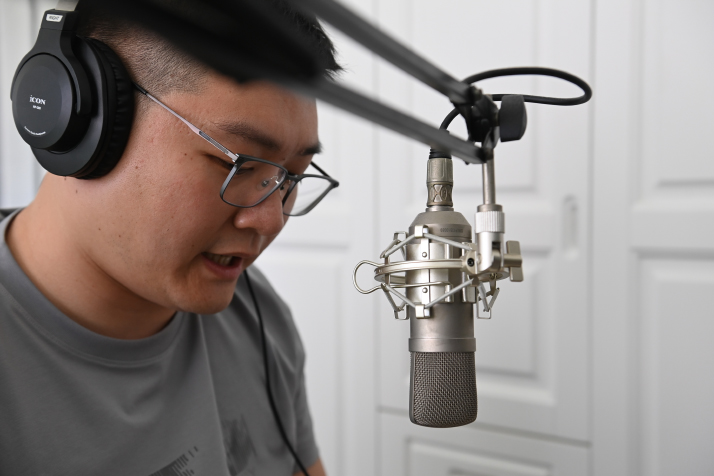| China |
| The 'ear economy' offers exciting opportunities for content creators and businesses, shaping the future of audio consumption | |
|
|
 Visitors experience products at a headphone booth during a consumer products expo in Haikou, Hainan Province, in April 2024 (XINHUA)
In the bustling city of Beijing, Zhang Jie, 34, a dedicated nine-to-fiver, has always found comfort in sound. Growing up, his home was filled with the rich voices of radio broadcasts. After school, he would gather with his family to listen to news, captivating storytelling and humorous traditional crosstalks. Those moments were more than just entertainment; they created a bond among them, turning their living room into a cozy theater of imagination. As Zhang entered adulthood, the Internet became more widely used and traditional radio began to fade from the public eye. But for Zhang, the love for audio storytelling never wavered. He adapted to the changing times and discovered podcasts—a modern twist on the auditory experiences he cherished as a child. Every morning during his commute on the subway, he would immerse himself in a world of sound, tuning into podcasts that covered everything from finance to career advice and even emotional wellbeing. "These sounds," he said in a conversation with Beijing Review, "are more than just background noise. They are my companions, my teachers and my escape. Each podcast episode is a window into different worlds, offering insights and stories that resonate with my own experiences." "In a fast-paced city, where connections are often fleeting, these voices make me feel less lonely," he added. Zhang is not alone in his fondness for audio products. According to data from business analytics platform Statista, the number of Chinese podcast listeners reached 134 million in 2024, meaning that 12 out of every 100 Internet users in the country were listening to podcasts last year. In today's fast-paced society, audio products like podcasts and audiobooks not only enhance people's personal lives but also contribute to the booming audio business. The growing market for these products is part of a broader shift in how audiences seek connection and knowledge in a rapidly evolving media landscape. New audio landscape Podcasts, audiobooks and radio dramas are gaining immense popularity due to their versatility and ease of use. They fit seamlessly into many daily activities, whether during the morning commute, while walking or before bed. People can simply open their favorite audio apps to enjoy stories, music or educational content, allowing them to relax while making the most of their fragmented time. According to data analysis provider iiMedia Research, the number of online audio users in China reached 540 million in 2024, with the audio economy estimated to have grown by 10.2 percent year on year to exceed 568 billion yuan ($78 billion). This market is anticipated to surpass 740 billion yuan ($102 billion) by 2029. Zhang said the in-depth content of podcasts allows for a thorough exploration of topics, helping users quickly grasp complex industries or events. Moreover, many listeners have also joined listener groups and interacting with hosts and fellow fans adds to the enjoyment, making podcasts not just informative but also a source of community. A report released by Ximalaya, a leading Chinese audio sharing platform, revealed the number of listeners for Chinese podcasts on the app has surpassed 220 million. Additionally, popular Chinese podcast platform Xiaoyuzhou, or Little Universe, revealed that in 2024, it added over 46,000 new shows and more than 400,000 episodes. Liu Zheng, head of the podcast business at Ximalaya, noted that the platform's listeners primarily consist of white-collar workers, business owners and civil servants. "These groups are eager to enrich themselves through learning and reflection, actively pursuing personal growth and breakthroughs," Liu told news portal People.cn. "Ximalaya's podcast programs effectively meet their core needs for enhancing knowledge, acquiring information and finding emotional comfort." According to Xiao Xiong, head of creator operations at Xiaoyuzhou, the platform's user base grew by about 50 percent in 2024 compared to the previous year. Currently, the majority of the app's users are aged between 18 and 35, and they tend to have high levels of education, income and spending power, Xiao added.  An enthusiast records an audiobook at home in Shenyang, Liaoning Province, in August 2023 (XINHUA)
Going commercial Cheng Yanliang, originally a cultural journalist, founded the cultural podcast Huzuo Huyou in 2018. At that time, he found podcasting simpler than writing articles, stating that it cut his workload in half since he no longer needed to organize interviews into written pieces. As a seasoned creator in the Chinese podcasting scene, he noticed a gap in cultural dialogue programs, which aligned with his expertise. Now, seven years later, his show has released nearly 500 episodes and amassed 2 million subscribers, maintaining a bi-weekly release schedule. As the user base continues to grow, the commercialization of podcasts is accelerating. Cheng noted in an interview with Xinhua News Agency that the commercial potential of podcasts is currently in a growth phase. Compared with previous years, more brands are willing to invest in marketing within the Chinese podcast space, spanning a wide variety of industries. Listeners are also increasingly receptive to commercialization. The 2024 Podcast Industry Report jointly released by Ximalaya, podcast network Ritan Gongyuan and Paris-headquartered global market research firm Ipsos indicates that 45.9 percent of surveyed users purchased paid podcast programs in the past year, and 63.6 percent are open to podcast advertisements. Cheng emphasized that advertising is crucial for the commercialization of long-form content. To attract new creators and retain existing ones for sustained production, commercialization is vital for the long-term prosperity of content creation. The content payment model for podcasts is still not fully developed. On one hand, there's more potential to explore in terms of brand advertising; on the other hand, users still need to develop a habit of paying for content. Tu Cheng, Vice President of Shanghai Ximalaya Technology Co. Ltd. that developed Ximalaya, emphasized that increasing users' willingness to pay fundamentally relies on understanding their true needs and providing high-quality content that offers real value. Empowered by AI The application of AI technology is becoming a new driver of growth in the podcast industry. Tao Zhulin, an associate professor at the Department of AI at Communication University of China, believes that AI can help creators generate more personalized content. Generative AI can assist in creating scripts, summaries or even audio clips. AI has also played an important role in acquiring users for audio platforms. Chen Qiang, CEO of Chinese audio sharing platform Qingting FM, told National Business Daily newspaper that AI can provide precise content recommendations and attract users, greatly enhancing user activity and retention on the platform. "However, to some extent, generative AI has lowered the barriers to audio creation, resulting in uneven quality of user-generated content [content created by ordinary users rather than professional creators]," Chen continued. This presents challenges for platform management. Chen said for authoritative news content, AI can convert text to audio quickly to reach users, while for emotionally intensive content, such as children's stories and educational materials, it is essential to retain real human narration. Copyedited by G.P. Wilson Comments to luyan@cicgamericas.com |
|
||||||||||||||||||||||||||||||
|